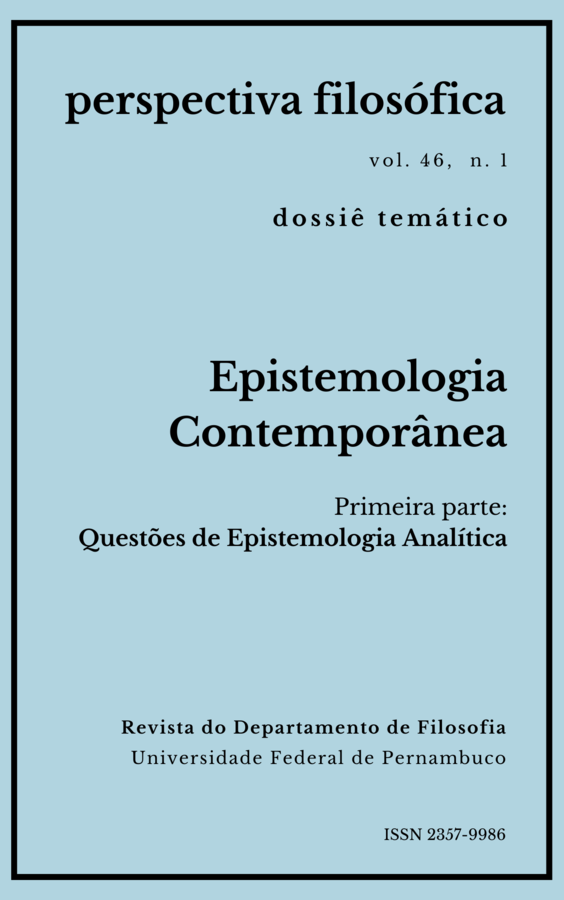Ensaio sobre a segunda pessoa
DOI:
https://doi.org/10.51359/2357-9986.2019.247945Keywords:
Donald Davidson, normativity, second person, triangulationAbstract
This essay is about the conception of second person in Donald Davidson. For Davidson, what characterizes a significant act and the possibility of the content of an attitude is the interaction between two agents driven by a primary intention: the speaker has the intention that his utterances be understood by another person. The essay is organized in three sections: in the first section, I present the specific meaning of the second person as a creaturewith whom the speaker currently interacts, regardless of whether they share a rule or linguistic convention beforehand. In the second section I present Davidson’s thesis of triangulation, which is that the individualization of beliefs and thoughts is established from systematic causal connections in triangulation between the individual, another speaker with whom he interacts, and objects or events in the world. Finally, in the third section, I present the idea of the “norm of conversation” as a theoretical tool to address epistemological issues: in conversation, when interlocutors intend to understand each other, speakers engage in a kind of investigation about the meaning and content of the sentences, beliefs, and intentions in dispute.
References
DARWALL, S. The Second-person Standpoint: Morality, Respect, andAccountability. Cambridge (MA), London: Harvard University Press, 2006.
BERNECKER, S. Triangular Externalism. In: LEPORE, E. & LUDWIG, K.(eds). A Companion to Donald Davidson. Malden: Wiley-Blackwell, p. 444-455, 2013.
DAVIDSON, D. Radical Interpretation. In: Inquiries into Truth andInterpretation. Oxford: Oxford University Press, p. 125-139, 1973.
DAVIDSON, D. Rational Animal. In: In: Subjective, Intersubjective,Objective. Oxford: Oxford University Press, p. 95-106, 1982.
DAVIDSON, D. Plato’s Philosopher. In: Truth, Language, and History.Oxford: Clarendon, 2005, p. 223-240, 1985.
DAVIDSON, D. The Conditions of Thought. In: BRANDL, J. &GOMBOCZ, W. L. (Eds.). The Mind of Donald Davidson. Amsterdam:Rodopi, p. 193-200, 1989.
DAVIDSON, D. “Three Varieties of Knowledge”. In: Subjective,Intersubjective, Objective. Oxford: Oxford University Press, p. 205-220,1991.
DAVIDSON, D. “The Second Person”. In: Subjective, Intersubjective,Objective. Oxford: Oxford University Press, p. 107-121, 1992.
DAVIDSON, D. “Dialectic and Dialogue.” In: PREYER, G. et al. (Eds.).Languague, Mind, and Epistemology.Dordrecht: Kluwer, p. 429-30, 1994.
DEWEY, J. Experience and Nature. New York: Dover Publ., 1925.
GADAMER, H.-G. Plato’s Dialectical Ethics: PhenomenologicalInterpretations Relating to the Philebus.
WALLACE, R. (Trad.). NewHaven, London: Yale UP, 1983.
KRIPKE, S. Wittgenstein on Rules and Private Language. Cambridge:Blackwell, 1982.
LEWIS, D. K. Convention: A Philosophical Study. Malden: Wiley-Blackwell, 1969.
MCGINN, C. Mental Content. Oxford: Basil Blackwell, 1989.QUINE, W. V. Ontological Relativity and Other Essays. New York:Columbia University Press, 1969.
VERHEGGEN, C. “Davidson’s Second Person”. In: The PhilosophicalQuarterly, v. 47, n. 188, p.361-369, 1997.
WITTGENSTEIN, L. Philosophical Investigations. ANSCOMBE, G. E. M.(trad). Oxford, Cambridge: Blackwell, 1953.
Downloads
Published
Issue
Section
License
A Revista Perspectiva Filosófica orienta seus procedimentos de gestão de artigos conforme as diretrizes básicas formuladas pelo Conselho Nacional de Desenvolvimento Científico e Tecnológico (CNPq). http://www.cnpq.br/web/guest/diretrizesAutores que publicam nesta revista concordam com os seguintes termos:
Os autores mantém os direitos autorais e concedem à revista o direito de primeira publicação, sendo o trabalho simultaneamente licenciado sob https://creativecommons.org/licenses/by/4.0/deed.pt_BR que permite o compartilhamento do trabalho com reconhecimento da autoria e publicação inicial nesta revista.
Os autores têm autorização para assumir contratos adicionais separadamente, para distribuição não-exclusiva da versão do trabalho publicada nesta revista, com reconhecimento de autoria e publicação inicial nesta revista (Consultar http://opcit.eprints.org/oacitation-biblio.html).

Esta revista está licenciada com uma Licença Creative Commons Atribuição 4.0 Internacional.













